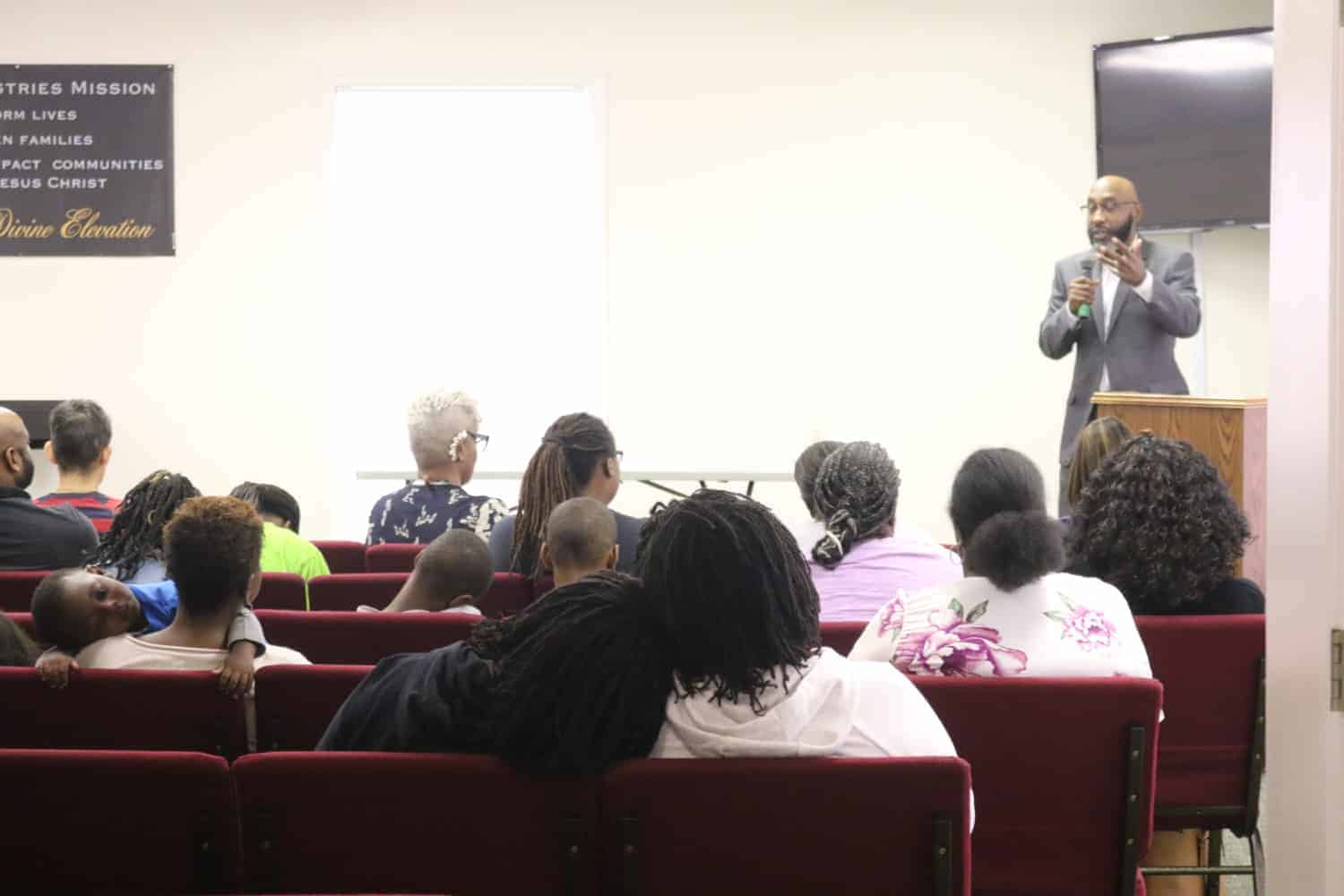After Dawn Baldwin Gibson realized her adopted daughter was struggling academically and socially due to trauma she experienced as an infant, she decided to open Peletah Academic Center for Excellence (PACE), a 25-student private school in New Bern centered around trauma-informed learning. Only a week after Hurricane Florence devastated the town in September, PACE opened its doors. Gibson said some teachers still had not been able to return to their flooded homes but knew students needed some sort of consistency.
“That first day, there were a lot of tears and there was a lot of sleeping,” Gibson said. “One thing about a safe space is they know it’s safe, because this is the place that’s now consistent, because their homes are not there, and they’re in different home settings with different people and different members of different families. And so they came in and you would just see them [sleeping] so we set up a resting room.”
There is the resting room, a “hurricane center” with food, clothing, and supplies for families, and charts on classroom walls with emotions that help students acknowledge how they are feeling. And Saturday, PACE hosted another way for students, families, and community members to begin the healing process. Coordinated by many organizations and native New Bernians, Florence victims came to learn about the ways a disastrous event can impact their emotions and brains.
“I think it’s important to have a conversation to discuss, to vent, to identify, to address the issues of trauma,” said Edward Bell, who is from New Bern and has been involved in education, racial justice, and program administration at the Department of Public Instruction. “Sometimes we don’t do that in our community, we just make assumptions that we’re just going to pray and leave it at the altar. But sometimes prayer and action is very important. And this is part of the action.”
Legal and mental health pop-up clinics assessed individuals’ needs and connected them with appropriate resources following a presentation and conversation around trauma. Omisade Burney-Scott, a consultant and advocate for racial and reproductive justice from New Bern, coordinated support from volunteers, Forward Justice, Legal Aid NC, the N.C. Justice Center, the Southern Coalition for Social Justice, and several other organizations that wanted to know how to help. Burney-Scott is also planning a Nov. 1 site visit for philanthropic foundations to visit New Bern, learn about its history as an “emancipation community” for black North Carolinians, and assess community needs from Florence.
Brendan Hargett, a researcher, licensed counselor, and clinical manager with Cardinal Innovations Health Care in Kannapolis, spoke on “the three Es” that explain trauma to a room full of parents, children, and individuals from the community: an Event that one Experiences as physically or emotionally harmful that can have lasting Effects.
“We unfortunately have taught children and even adults that they’re not supposed to feel the event,” Hargett said. “The effects, the outcomes, or being sorrowful, being sad, that is what we call a normal response to an abnormal event.”
Hargett explained how traumatic experiences can alter brain development of young children that impacts how that individual processes later trauma. If uncomfortable emotions go unaddressed through adulthood, Hargett said parents struggle to help their own children process harmful events.
“I think if nothing else, we want to be able to put that into context when kids are sad or disappointed about something that has happened, part of our response as parents is allow them to feel what they feel,” Hargett said. “And sometimes as parents, if we’ve had our own experiences that we haven’t had fixed, and now it’s affecting our child, if we did not manage that well, we tend to project that onto the child: ‘Get over it, suck it up.'”
Hargett said there are a variety of ways trauma can surface in one’s life. Certain events, like the possibility of more flooding with Hurricane Michael’s arrival weeks after Florence, can trigger an individual’s response to the original event. Prolonged sadness, absent-mindedness, denial, fear, anxiety, anger, and guilt are all emotions Hargett said are normal after a traumatic experience or triggering event.
So how should people manage those emotions? Hargett suggested creating a routine, getting exercise, finding an open support system, practicing patience with oneself, and taking necessary alone time are all important. He also gave a reminder specifically to caregivers — teachers, pastors, and leaders who serve others daily — to set healthy emotional limits.
“A coworker said to me years ago … ‘When you give, give from your overflow,'” Hargett said. “So we have to create the overflow because if I’m not giving you the extra, then it’s draining me, and therefore it takes away from my life. So I have to create the extra, I have to do what I need to do to replenish, because I’m a giver and I have to do that.”
For Latonia Barnes, who was rescued from her home along with her children, her focus has been on her kids. Her daughter, a PACE student, has been scared to go back to the home where they are temporarily staying with Barnes’s in-laws, afraid that it might flood.
“We just needed some help with trying to explain to her what happened and where we moved,” Barnes said. She said Hargett’s coping strategies were helpful in realizing her own emotional reaction, which has taken the form of guilt for staying through the storm and nightmares of the dirty flood water. Barnes said Hargett’s words helped her feel that acknowledging those reactions will help to eventually stop them.
She said Saturday’s environment is one that is needed to address how people work through the personal implications of the hurricane and its aftermath.
“The community has come together giving out supplies, but there’s nothing like coming together and actually talking about it, you know, talking about your experience, talking about what you’re going through, instead of just … Yes, those supplies help, but when that’s over and done with, there’s still going to be feelings and thoughts connected with what happened.”



